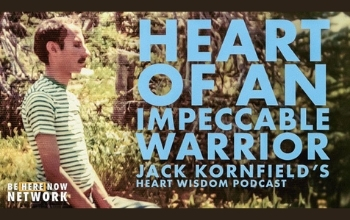Unhealthy thoughts can chain us to the past. They arise as vipaka, the result of past karma that we cannot change. We can, however, change our destructive thoughts in the present. Through mindfulness training we can recognize them as bad habits learned long ago. Then we can take the critical next step. We can discover how these obsessive thoughts cover our grief, insecurity, and loneliness. This underlying suffering needs to be held with compassion. As we gradually learn to tolerate these underlying energies, we can reduce their pull.
But even knowing their source and feeling them with compassion is not enough to transform the most difficult patterns. We have to replace them. This is the movement of creating healthier karma. Such thought replacement can be challenging, for we are loyal to our stories. They become our identity. There’s an uneasy moment when the destructive stories we have been telling ourselves collapse. We can feel worried, doubtful, spacey, or frightened of the unknown.
Sometimes we have to pry ourselves loose from their power and bad advice. But underneath destructive thoughts is a part of us that knows such thoughts are not true, not valid, not alive. And with a release of these old stories, a whole new perspective dawns. Fear can be transformed into presence and excitement. Confusion can open up into interest. Uncertainty can become a gateway to surprise. And unworthiness can lead us to dignity.
This excerpt is from the book, “The Wise Heart: A Guide to the Universal Teachings of Buddhist Psychology”





